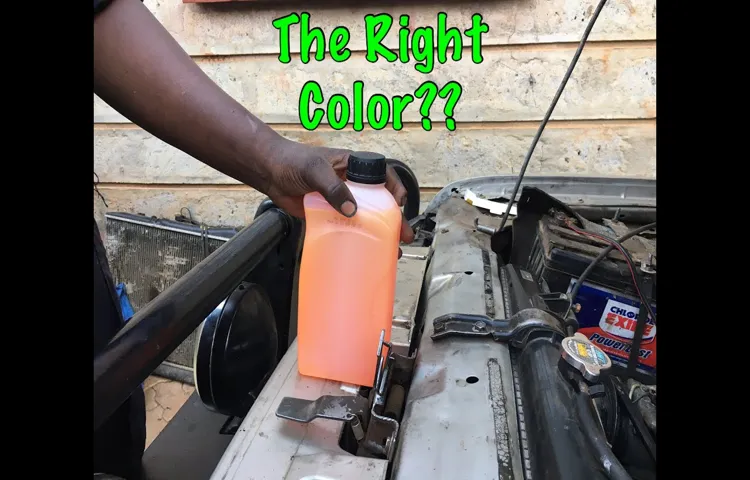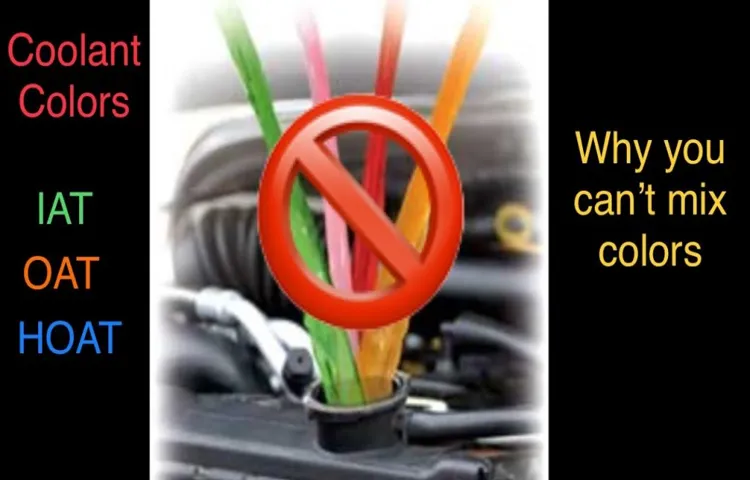Hey there! Have you ever wondered if the type of coolant you use in your vehicle really makes a difference? Well, the answer is yes, it does! Coolant, also known as antifreeze, is an essential fluid that helps regulate the temperature of your engine and prevents it from overheating. But not all coolants are created equal. Think of it this way: choosing the right coolant for your vehicle is like choosing the right fuel for your body.
You wouldn’t fill up your car with diesel if it requires unleaded gasoline, right? The same goes for coolant. Different vehicles have different requirements when it comes to the type of coolant they need. Using the wrong coolant in your vehicle can lead to a number of issues.
For starters, it may not provide the necessary level of protection against freezing and boiling temperatures. This can result in corrosion, leaks, and even engine damage. Additionally, using the wrong coolant can void any warranties you may have on your vehicle.
So, how do you know which coolant is right for your vehicle? It’s always best to consult your owner’s manual or check with a trusted mechanic. They can help you determine the correct type of coolant to use based on your vehicle’s make, model, and year. It’s also important to note that coolants come in different colors, which can indicate their specific composition and compatibility with certain vehicles.
In conclusion, choosing the right coolant for your vehicle is not just a matter of preference, but a matter of ensuring optimal performance and longevity. Don’t overlook this important fluid when it comes to maintaining the health of your engine. So, next time you’re topping off your coolant, make sure you’re using the right one for your vehicle.
Your engine will thank you!
Table of Contents
Understanding Coolant
Does it matter what coolant I use in my car? The answer is yes, it does. Coolant plays a crucial role in regulating the temperature of your engine and preventing it from overheating. Using the wrong type of coolant can lead to serious problems and potential damage to your engine.
Different engines require different types of coolant, so it’s important to consult your vehicle’s owner’s manual or talk to a professional mechanic to determine the right coolant for your car. Also, it’s important to make sure that you mix the coolant with the right amount of water, as using too much or too little water can affect the cooling effectiveness of the coolant. So, next time you’re topping off your coolant, make sure you’re using the right type and following the proper mixing instructions.
Your engine will thank you for it.
What is Coolant?
coolant, understanding coolant

Importance of Coolant in Vehicle Performance
coolant, vehicle performance Have you ever wondered why coolant is important for your vehicle’s performance? Well, coolant, also known as antifreeze, plays a crucial role in maintaining the temperature of your engine. It is a specially formulated liquid that is mixed with water and circulated through the engine to regulate its temperature. Think of coolant as the bloodstream of your vehicle.
Just like how our blood helps regulate our body temperature, coolant helps to keep your engine cool and prevent it from overheating. This is crucial because an overheating engine can lead to serious damage and costly repairs. But coolant doesn’t just keep your engine cool.
It also helps prevent freezing in extremely cold temperatures. During the winter season, the coolant’s antifreeze properties ensure that the engine doesn’t freeze up, causing the engine block to crack and resulting in major damage. Furthermore, coolant also plays a role in preventing corrosion and rust within the engine.
Over time, the combination of water, engine heat, and metal components can lead to the formation of rust and corrosion. Coolant contains additives that help protect the engine from these harmful effects, keeping it running smoothly and extending its lifespan. To ensure optimal performance, it is important to regularly check and maintain the coolant levels in your vehicle.
If you notice that the coolant is low or dirty, it is advisable to have it flushed and replaced by a professional mechanic. Ignoring coolant maintenance can lead to inefficient cooling, decreased fuel efficiency, and potential engine damage. In conclusion, coolant is not just a mere liquid in your vehicle’s engine.
It is a crucial component that helps regulate temperature, prevent freezing, and protect against corrosion. By understanding the importance of coolant and ensuring its proper maintenance, you can enhance your vehicle’s performance and prevent costly repairs. So next time you start your engine, remember to give thanks to the coolant for keeping your ride running smoothly!
Types of Coolants
coolant, types of coolants, automotive coolant, engine coolant Blog Section: Coolant is an essential component in maintaining the optimal functioning of a vehicle’s engine. But what exactly is coolant, and why is it important? In simple terms, coolant is a liquid that circulates through the engine to regulate its temperature and prevent overheating. It absorbs heat from the engine and carries it away to the radiator, where it is then cooled before being circulated back into the engine.
Understanding the different types of coolants available can help vehicle owners make informed decisions about which one is best suited for their needs. There are various types of coolants available, each with its own advantages and disadvantages. The most commonly used coolant is ethylene glycol-based coolant, also known as “green coolant.
” This type of coolant provides excellent heat transfer properties and has a high boiling point, making it suitable for high-temperature engines. However, it is important to note that ethylene glycol-based coolants are toxic and need to be handled with care, especially if accidental ingestion occurs. Another type of coolant is propylene glycol-based coolant, also referred to as “orange coolant.
” This coolant is less toxic than its ethylene glycol counterpart and has a lower viscosity, making it flow more easily through the engine. It is also less likely to cause clogging or damage to the cooling system. Propylene glycol-based coolants are often used in newer vehicles as they are more environmentally friendly.
In recent years, there has been a rise in the use of hybrid organic acid technology (HOAT) coolants. HOAT coolants combine the benefits of ethylene glycol-based and propylene glycol-based coolants. They have a longer service life and offer better protection against rust, corrosion, and cavitation.
HOAT coolants are commonly used in modern automotive engines, especially those with aluminum components. It is essential to refer to the vehicle manufacturer’s recommendations when selecting a coolant. Using the wrong type of coolant can lead to engine damage and decreased performance.
Effects of Coolant on Your Vehicle
Does it matter what coolant I use in my vehicle? Absolutely! The type of coolant you use can have a significant impact on the performance and longevity of your car’s engine. Coolant, also known as antifreeze, plays a crucial role in regulating the temperature of your engine and preventing it from overheating. Different vehicles have different coolant requirements, so it is essential to use the right type of coolant recommended by your vehicle’s manufacturer.
Using the wrong coolant can lead to issues such as engine overheating, corrosion, and damage to the cooling system. It’s like trying to fit a square peg into a round hole – it just doesn’t work! So, next time you need to top up your coolant or perform a coolant flush, make sure to use the correct coolant for your vehicle. Your engine will thank you!
Cooling System Efficiency
coolant, vehicle, effects, coolant system, cooling system efficiency, engine temperature, overheating, radiator, maintenance, performance, heat transfer, corrosion, rust, lubrication, seals When it comes to maintaining the efficiency of your vehicle’s cooling system, one of the key components to pay attention to is the coolant. The coolant plays a vital role in regulating the engine temperature and preventing overheating. It circulates through the engine and is responsible for carrying the heat away from the combustion process and transferring it to the radiator, where it is dissipated into the surrounding air.
But what exactly does coolant do, and why is it important? Well, coolant not only helps to cool down your engine but also provides lubrication for the seals and other moving parts in the cooling system. It also helps to prevent corrosion and rust from forming in the radiator and other components. Without the proper level and quality of coolant, your vehicle’s cooling system can become less efficient, leading to potential problems such as overheating and decreased performance.
Regular maintenance of your coolant system is essential to ensure its optimal performance. This includes checking the coolant level and quality regularly and flushing and replacing the coolant according to the manufacturer’s recommendations. It’s also important to choose the right type of coolant for your vehicle, as different engines may require different types of coolant.
In conclusion, the coolant in your vehicle’s cooling system plays a critical role in maintaining its efficiency and preventing overheating. By ensuring that your coolant is of the correct type and quality, and by regularly maintaining your cooling system, you can help to ensure that your vehicle’s engine remains at the right temperature and performs at its best. So, don’t forget to give your coolant the attention it deserves to keep your vehicle running smoothly.
Corrosion and Rust Prevention
coolant, vehicle maintenance, rust prevention, corrosion prevention, cooling system, engine temperature
Freezing and Boiling Point Protection
coolant, vehicle, freezing point, boiling point, protection, effects
Choosing the Right Coolant
When it comes to choosing the right coolant for your vehicle, you might be wondering if it really matters what kind you use. The short answer is yes, it does matter. Choosing the correct coolant for your specific vehicle can help to prolong the life of your engine and prevent overheating.
Different vehicles require different types of coolant, so it’s important to consult your owner’s manual or talk to a professional to ensure you’re using the right one. Using the wrong coolant can lead to corrosion, clogs, and other damage that can be costly to repair. So, while it may seem like a small detail, choosing the right coolant for your vehicle is an important decision that can help to ensure your engine stays cool and running smoothly.
Vehicle Manufacturer Recommendations
coolant, vehicle, manufacturer recommendations
Considering Ethylene Glycol vs. Propylene Glycol
coolant, ethylene glycol, propylene glycol, choosing the right coolant
Matching Coolant Specifications to Your Vehicle
coolant specifications
Conclusion
In the grand scheme of the universe, one might argue that the type of coolant you use in your car is as inconsequential as the proverbial drop in the ocean. However, in the realm of practicality and preserving the life of your vehicle, it does matter what coolant you use. You see, the choice of coolant is not just a mere matter of personal preference or arbitrary whimsy.
It is a decision that can have a tangible impact on the performance and longevity of your engine. Using the wrong coolant can lead to a myriad of issues, ranging from decreased efficiency and increased wear and tear, to the dreaded engine overheating. Just like a knight needs the perfect armor to conquer its foes, your car needs the right coolant to conquer the challenges of the road.
It needs a coolant that can withstand extreme temperatures, fend off corrosion, and ensure that the internal components of the engine remain in pristine condition. Therefore, opting for a high-quality coolant specifically designed for your vehicle is not only wise but also a testament to your commitment to automotive excellence. But alas, the world of coolants can be a treacherous and bewildering place.
There are countless brands, colors, and formulations vying for your attention, each claiming to be the superior choice. Fear not, intrepid car enthusiast, for knowledge is your trusty companion in this quest. Consult your vehicle’s manual or seek the advice of a trusted mechanic to determine the coolant that best suits your chariot.
In conclusion, while the choice of coolant may not be as momentous as choosing the fate of nations or the meaning of life, it is a decision that should not be taken lightly. So, my fellow automobile aficionados, let us bid adieu to ignorance and embrace the power of informed decisions. Remember, the right coolant can be the silent hero that safeguards your engine’s well-being, and what could be more important than that?
FAQs
Does it matter what coolant I use in my car?
Yes, it does matter what coolant you use in your car. Using the wrong coolant can cause damage to your engine and cooling system, so it’s important to use the coolant specified by your vehicle’s manufacturer.
Can I mix different types of coolant?
It is generally not recommended to mix different types of coolant. Different types of coolant have different chemical compositions, and mixing them can result in a less effective coolant mixture or even cause damage to your cooling system.
What happens if I use the wrong coolant?
If you use the wrong coolant in your car, it can lead to engine overheating, coolant leaks, and potential damage to your engine components. It’s always best to use the coolant specified by your vehicle’s manufacturer to ensure optimal performance and longevity of your cooling system.
Are all coolants the same?
No, not all coolants are the same. There are different types of coolant, such as ethylene glycol-based and propylene glycol-based coolants. They differ in their chemical composition and properties, so it’s important to choose the right coolant for your specific vehicle.
Can using the wrong coolant void my car’s warranty?
It is possible that using the wrong coolant in your car could void your warranty. Manufacturers often specify the type of coolant that should be used, and if you don’t follow their recommendations, it could potentially affect your warranty coverage.
How often should I change the coolant in my car?
The frequency of coolant changes can vary depending on your vehicle’s make and model, as well as the type of coolant used. It’s best to consult your vehicle’s owner’s manual or contact a professional mechanic to determine the recommended coolant change interval for your specific car.
Can I use tap water instead of coolant?
It is not recommended to use tap water instead of coolant in your car’s cooling system. Tap water contains minerals and impurities that can cause deposits and corrosion within the cooling system. It’s best to use a mixture of distilled water and the specified coolant for your vehicle.



